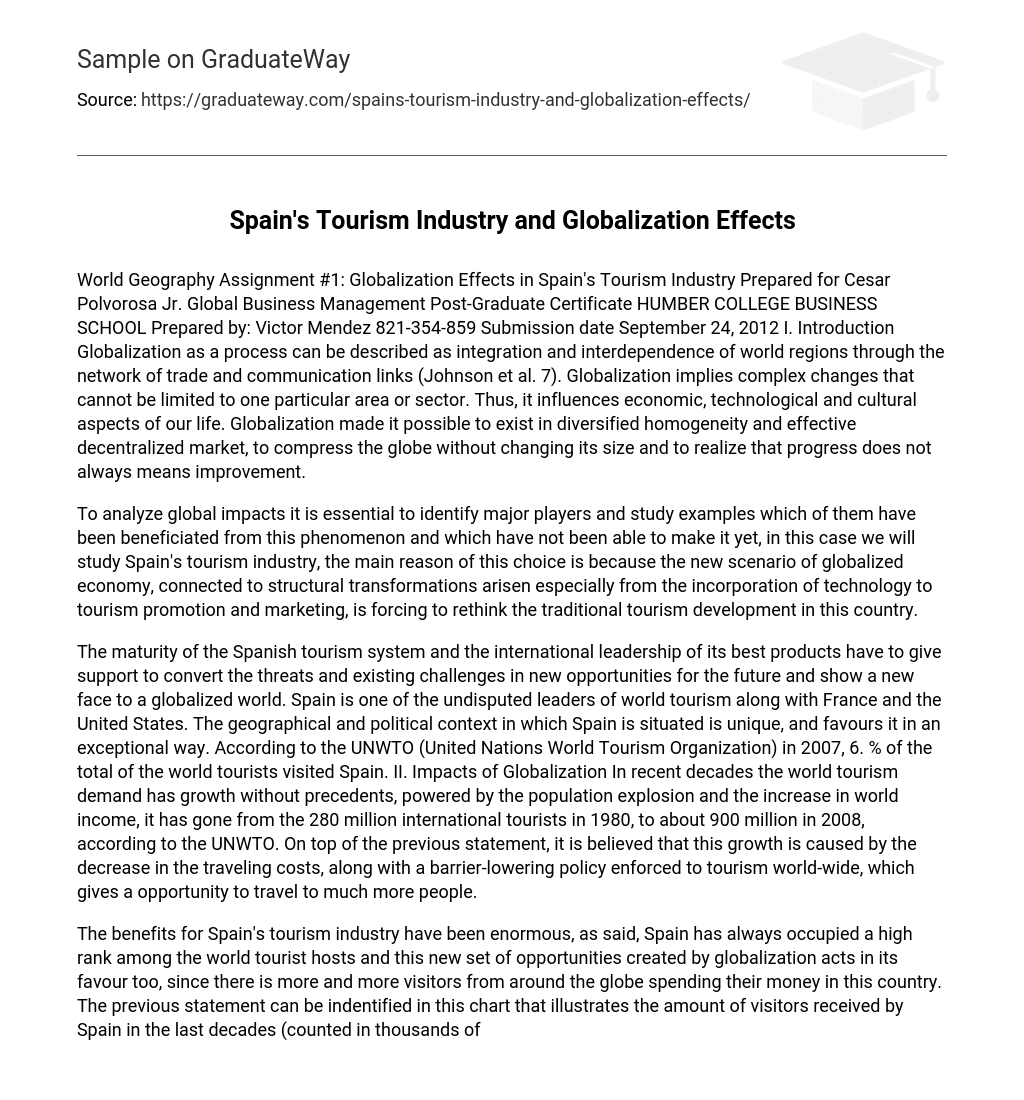Globalization as a process can be described as integration and interdependence of world regions through the network of trade and communication links (Johnson et al. 7). Globalization implies complex changes that cannot be limited to one particular area or sector. Thus, it influences economic, technological and cultural aspects of our life. Globalization made it possible to exist in diversified homogeneity and effective decentralized market, to compress the globe without changing its size and to realize that progress does not always means improvement.
To analyze global impacts it is essential to identify major players and study examples which of them have been beneficiated from this phenomenon and which have not been able to make it yet, in this case we will study Spain’s tourism industry, the main reason of this choice is because the new scenario of globalized economy, connected to structural transformations arisen especially from the incorporation of technology to tourism promotion and marketing, is forcing to rethink the traditional tourism development in this country.
The maturity of the Spanish tourism system and the international leadership of its best products have to give support to convert the threats and existing challenges in new opportunities for the future and show a new face to a globalized world. Spain is one of the undisputed leaders of world tourism along with France and the United States. The geographical and political context in which Spain is situated is unique, and favours it in an exceptional way. According to the UNWTO (United Nations World Tourism Organization) in 2007, 6. % of the total of the world tourists visited Spain. II. Impacts of Globalization In recent decades the world tourism demand has growth without precedents, powered by the population explosion and the increase in world income, it has gone from the 280 million international tourists in 1980, to about 900 million in 2008, according to the UNWTO. On top of the previous statement, it is believed that this growth is caused by the decrease in the traveling costs, along with a barrier-lowering policy enforced to tourism world-wide, which gives a opportunity to travel to much more people.
The benefits for Spain’s tourism industry have been enormous, as said, Spain has always occupied a high rank among the world tourist hosts and this new set of opportunities created by globalization acts in its favour too, since there is more and more visitors from around the globe spending their money in this country. The previous statement can be indentified in this chart that illustrates the amount of visitors received by Spain in the last decades (counted in thousands of people) which indicates that it has been increasing year after year, as a result of the elements explained before.
Nevertheless, globalization can also have negative results, studies have shown that due to the global economical collapse in 2008, directly affected the number of tourists received, specifically dropping in 2,3% from 2007, followed by 2009, when Spain received 12% less tourists than 2008, all of this according to UNWTO. As explained beforehand, globalization is lowering barriers for travelers around the world, giving them the chance to reach new latitudes, on the other hand, this also gives opportunities to other countries to exploit heir tourism industry, an important aspect to understand from the competitive pressures to which it is subjected Spanish tourism in recent years is the growth presented by tourist countries around the Mediterranean such as Turkey, Morocco, Tunisia or Croatia, which have started to take advantages of the modern world, in order to sell travel destinations for tourists around the planet. In order to face this, Spain is rethinking some tourist businesses, trying to combine various services with added value and a better adaptation to a globalized world, with the objective to make the product competitive without sacrificing quality.
By enhancing competition and productivity through the exploitation of a bigger economy, with differentiation and specialization of product, technology, and partnerships with tourism corporations. Such strategies would reduce costs and allow best prices and increase demand which increases our profits. All of this relying on the technology (online marketing) and mass media communications.
As a final consideration, globalization must always be considered a double-edged sword since (as explained) a globalized world will be a source of new tourist from all around the world, however it also opens the door for new players to come in and take a bite at the global tourism market share, that is why it is urgent to take on new challenges and possibilities that new technologies provide us, in order to emphasize the competitive advantage of Spain as a world leading destination, maintaining its position as a tourism leader around the world. In other words, innovate to become more efficient, more competitive, more productive and more sustainable thereby responding to the transformation of society and keeping up with a fast-paced world.





